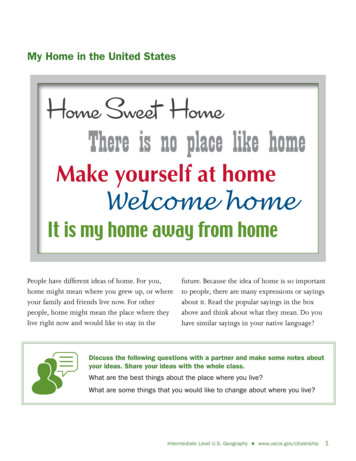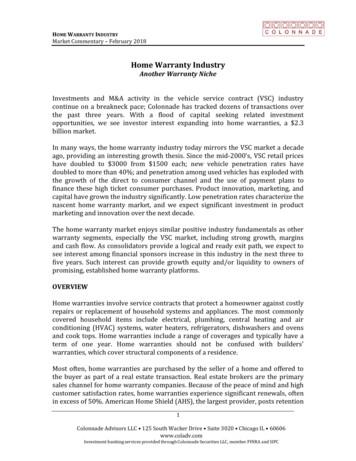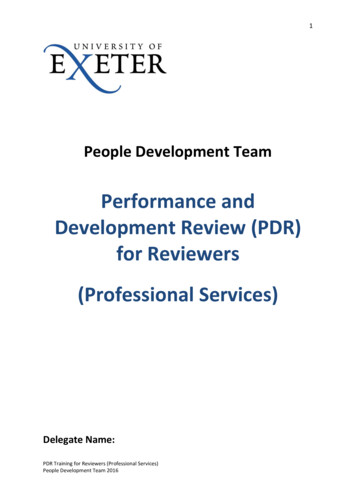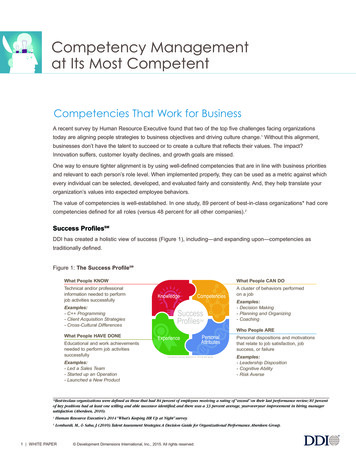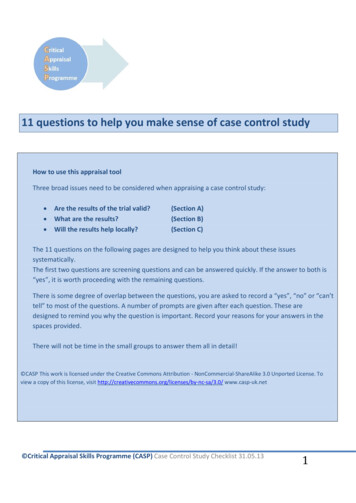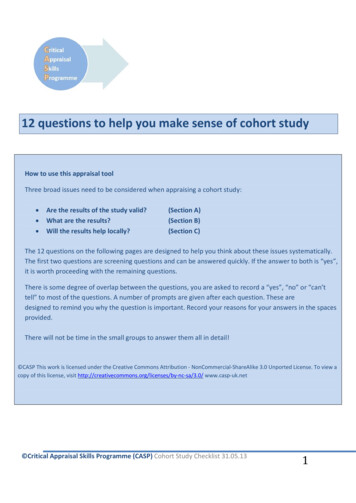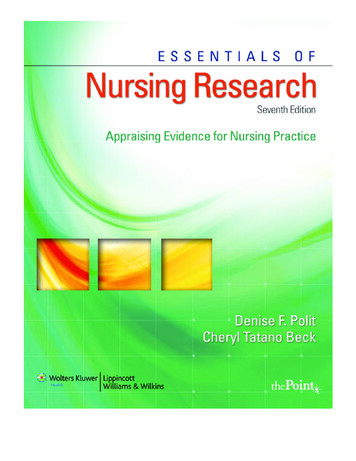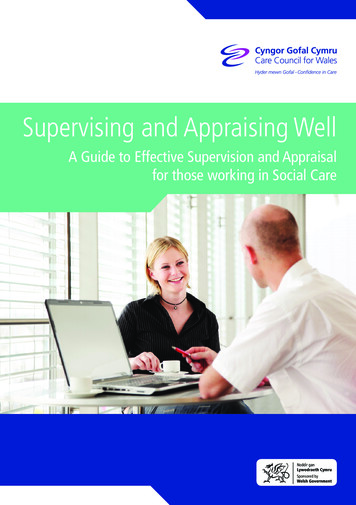
Transcription
Supervising and Appraising WellA Guide to Effective Supervision and Appraisalfor those working in Social Care
Contact DetailsCare Council for WalesSouth Gate HouseWood StreetCardiffCF10 1EWTel: 0300 30 33 444Fax: 029 2038 4764Minicom: 029 2078 0680E-mail: info@ccwales.org.ukwww.ccwales.org.ukISBN: 978-1-906528-37-9 2012 Care Council for WalesAll rights reserved. No part of this publication may be reproduced,stored in a retrieval system or transmitted in any form or by anymeans without the prior written permission of the Care Councilfor Wales. Enquiries for reproduction outside the scope expresslypermitted by law should be sent to the Chief Executive of the CareCouncil for Wales at the address given above.Further copies and other formatsFurther copies of this documentare available in large print or otherformats if required.
Supervising and Appraising WellContentsForeword2Introduction4What is performance managementand improvement?4What is supervision?5What is appraisal?5What is the difference between supervision and appraisal?5Section 16What are the benefits of supervision and appraisal?6Developing performance managementand improvement skills8The supervision process10Care and Social Services Inspectorate Wales14The supervision meeting16Section 218Supervision contract/agreement - example23Supervision policy - example25Record of staff supervision meeting - example28Staff evaluation of supervision - example31Appraisal record form - example331
ForewordThe Care Council for Wales (Care Council) is the social careworkforce regulator in Wales and is responsible for promotingand securing high standards across the social care, childcare andearly years workforce. The Care Council aims to ensure that theworkforce in Wales has the right skills and qualifications to workto a high professional standard, and is capable of delivering highquality services. The Care Council supports the view that thequality of provision is enhanced when social care workers haveaccess to comprehensive, structured professional support andperformance management. Good quality supervision is a priorityfor all social care providers.The Care Council has produced this booklet to provide practicalguidance, clarity, ideas and examples.2
Supervising and Appraising WellThis booklet is divided into two sections:Section 1:General information and guidance on supervision and appraisals.Section 2:Practical templates and examples that you may wish to adapt foryour use.Who is this guidance for?This guidance is for everyone responsible for carrying outsupervision and appraisal with social care workers.Who needs supervision and appraisal?All social care workers and managers, whether they are full,part-time, volunteers, apprentices or work placement studentsneed supervision and appraisal.3
IntroductionPerformance management, supervision and all appraisal andevaluation within social care should be undertaken bearing inmind the principles laid out in the Code of Practice for Social CareWorkers and the Code of Practice for Social Care Employers.Effective supervision also promotes a culture of learning withinorganisations, encouraging individuals to discuss their learningneeds and how to address these. It also takes into accountindividuals’ language and cultural needs, and in Wales, practiceand professional issues around Welsh language and cultural needs.What is performance managementand improvement?Performance management is a means of enabling and deliveringthe best possible service through processes such as: settingoutcomes, goals, and expectations, monitoring progress,measuring outcomes, and recognising or supporting improvementfor individual workers and the workforce as a whole.SupervisingPerformanceManagement andImprovementMonitoringand Review4SettingGoalsAppraisal
Supervising and Appraising WellWhat is supervision?Supervision is an accountable, two-way process, which supports,motivates and enables the development of good practice forindividual social care workers. As a result, this improves the qualityof service provided by the organisation. Supervision is a vital partof individual performance management. A general definition of supervision is suggested by TonyMorrison (2001) as1: A process by which one worker is given responsibility by theorganisation to work with another worker(s) in order to meetcertain organisational, professional and personal objectives.What is appraisal?Appraisal is a more formal process involving the review of asocial care worker’s performance and improvement over aperiod of time, usually annually. It includes evaluation of goalsand objectives; evaluation of job role; identifying positiveperformance; identifying areas for improvement and identifyingand planning how development needs will be met.What is the difference between supervision and appraisal?Supervision is the regular, contact between a supervisor and asocial care worker in which to monitor and reflect on practice;review and prioritise work with individuals; provide guidance andsupport and identify areas of work that need development.Appraisal is the evaluation process that follows the monitoringof practice and performance. It allows job and individualdevelopment objectives and plans, with milestones, to be agreedfor ongoing review through supervision.1Staff Supervision in Social Care, Tony Morrison (2001)5
Section 1Effective performance management and improvement is one ofthe most important elements in ensuring positive outcomes forservice users and carers who use social care services. It also has acrucial role to play in the development, retention and motivationof the social care workforce.What are the benefits of supervision and appraisal?For the organisation: S upporting the social care worker to understand theorganisational values, also what outcomes the organisationis working to and how they contribute to these. Ensuring that service users and their carers receivea quality service. Enabling understanding and implementation of policiesand procedures. Improving internal communication. Sharing responsibility for achieving outcomes. Promoting staff retention. Reducing rates of grievances, sickness and complaints. Supporting the social care worker to achieve theorganisation’s outcomes and standards. Promoting clear communication between the organisationand the social care worker. Ensuring that the social care worker has a manageable andappropriate workload. To adhere to the relevant Care and Social Services InspectorateWales (CSSIW) National Minimum Standards and the CareCouncil for Wales’ Code of Practice for Social Care Workers. Promoting good practice.6
Supervising and Appraising WellFor the professional social care worker: S upports the social care worker to be clear about his or herresponsibilities and accountabilities and competent in hisor her role. The opportunity to reflect on, analyse and evaluate practice. Enables setting, agreeing and reviewing SMART (specific,measurable, achievable, realistic, timely) goals and objectives. Provides constructive feedback. Promotes consistency of practice. Recognises and values good practice. Supports the health and well being of the social care worker. Supports people to understand their role in the socialcare workforce. Reinforces clear professional boundaries. Promotes self confidence. Identifies learning and development needs. Identifies possible coaching and mentoring needs. Develops team working. Increases transparency and openness.For the service user: A worker is clear about their roles and duties and has hadopportunities to discuss and develop their learning, enablingthe provision of quality care services. A worker who has a clear understanding of the requirementsof the Code of Practice for Social Care Workers.7
Developing performance managementand improvement skillsThe person with responsibility for performance management andimprovement needs to develop the competence to undertakesupervision and/or appraisal.This could be through: Management, learning and development programmesand qualifications. Specific supervision and/or appraisal programmes todevelop competence and skills. Refresher training at agreed intervals.Shadowing a more experienced supervisor.Personal and professional attributes for managingperformance and improvement: 8Honesty and integrity.Listening and communication skills.Leadership and motivational skills.Being a good role model.Analysis of practice.Confidence building skills.Boundary setting.Policy and practice knowledge and credibility.Knowledge and understanding of staff development.Flexibility and a ‘worker centred’ approach.
Supervising and Appraising WellWhat staff can expect from supervision: T o experience supervision that enables them to grow anddevelop in their professional role. That supervision meetings promote equality and valuediversity both personally and within the organisation. To have supervision treated as a priority commitment. To have feelings and opinions recognised and respected. To be treated as a respected professional colleague. To be able to express professional disagreement. To be supported to learn from mistakes. To ask for and receive advice and guidance. To have confidential supervision sessions in line withorganisational policy.Responsibilities of the supervisor: To ensure that supervision is in line with organisational policy.To prioritise supervision sessions.To plan supervision sessions.To prepare well for supervision sessions. To identify and record accountability for the work ofsupervised staff.To provide support and guidance to supervised staff.To obtain feedback from the individual and others.To enable and promote reflective practice for supervised staff. To identify development needs and opportunities ofsupervised staff.To record all decisions and discussions in the supervision record.To record service user related decisions in the service user file.Implement any agreed actions. To maintain confidentiality of supervision in line withorganisational policy.9
Responsibilities of the supervised social care worker: To attend all planned supervision sessions.To prioritise supervision sessions.To plan supervision sessions.To prepare well for supervision sessions. To use the session positively to discuss work andprofessional development. To identify any situations that are outside their competenceor where they are unsure.To implement any agreed actions.To read and agree the supervision record. To reflect on learning and development activities and howthese have an impact on practice.The supervision processSupervision and Appraisal PolicyIt is good practice for all social care organisations to have a clearsupervision and appraisal policy that: Provides a clear definition of supervision that is linked toorganisational outcomes and values.Sets clear expectations and boundaries.Stipulates frequency, duration, location and recording. Provides an organisational proforma for supervisioncontracts and records. Clarifies confidentiality and access to supervision andappraisal notes.Highlights the importance of supervision and appraisal. Makes clear the role, tasks, rights and responsibilities of thesupervisor and workers.10
Supervising and Appraising Well Emphasises that supervision and appraisal is an entitlementfor all staff, regardless of role. Demonstrates how quality supervision and appraisal links toperformance management and improvement.Supervision contract or agreementEvery supervisor should make a written contract/agreement withthe workers they supervise.It needs to include:The frequency of supervision sessions.The approximate length of sessions.The location of sessions.The main areas for discussion/agenda items.Confidentiality boundaries. The format, responsibility and timing of recordingsupervision sessions.Procedure for complaints/reconciling differences.Contracts that set out what either party can expect fromsupervision which enable the organisation to audit and monitorsupervision performance.11
Why should supervision be recorded?To keep a record of what was discussed and actions agreed.To keep a record of any matters or disagreements.To benchmark and audit the quality of supervision.For performance management of staff.At the end of each session, or as soon as possible thereafter,both supervisor and member of staff should sign and date thesupervision form to confirm its accuracy. Each party will keep acopy of the recording sheet. The supervisor’s copy may be kept ina supervision file or personal staff file. The organisation may alsostore the records electronically.ConfidentialityIt is important for staff to be comfortable in discussing all aspectsof their work. To encourage this, there needs to be clarity as towhat will happen to information discussed. The supervisor mustclarify this with all supervised staff.The supervision record should be accessible to the supervisorand staff member at any time. Although this is a confidentialdocument, it is also an organisational document which does notbelong solely to the supervisor and member of staff. A supervisionpolicy should specify in what situations others can access thisrecord. This needs to be clear to both parties.12
Supervising and Appraising WellSuch situations might include:Auditing.Internal/external inquiry.Grievance.Disciplinary cy of supervision depends on a number of factors:The organisation’s supervision policy.The experience, confidence and competence of the worker.The individual’s support needs.If there are performance issues.Compliance with National Minimum Standards.Key message: New employees, apprentices, trainees, volunteers and thosemembers of staff where there are performance concerns mayneed more frequent supervision. Where face-to-face meetings are problematic e.g. rural areas,some supervision sessions can be held via electronic meanse.g. telephone, video etc.13
Review and evaluationEach year the organisation should undertake a review of itssupervision practice as part of planning and review processes.The review should include:Frequency and nature of supervision.Staff satisfaction with the quality of supervision.Organisational and policy issues identified by supervision.It is not just the existence of supervision that makes a difference toservice users and staff, but good quality and effective supervision.Care and Social Services Inspectorate in Wales NationalMinimum Standards for Care Homes and DomiciliaryCare AgenciesThe National Minimum Standards on staff supervision areas follows:‘Staff have regular, recorded supervision meetings at least onceevery two months (3 months for Domiciliary care) with theirsenior/manager in addition to regular contact on day to daypractice (fortnightly supervision where there is no regular contact;pro-rata for part-time staff), covering: translation of the home’s philosophy and aims into workwith individuals. monitoring of work with individual service users. support and professional guidance. identification of training and development needs.’14
Supervising and Appraising WellKey conditions for delivering the supervisionand appraisal sessionPreparation lan for the supervision session, prioritise what needs to be1 Pdiscussedand ensure you have pen and paper to take notes. Review the supervision record of the previous session, andnote items and action plans that need following up.2 Set supervision dates in advance so that they are plannedand valued.3 Check whether there are likely to be any unavoidableinterruptions (these should really be exceptional).4 Ensure the physical environment is laid out to allow theworker to express feelings, worries and be mindful ofconfidentiality issues.515
The supervision meetingStart the meeting on time. If you don’t make supervision a priority,neither will the supervised workers.1. Confirm the agenda. Make sure the worker has had anopportunity to contribute to the agenda.2. Start the meeting by asking the worker how they are, in orderto promote their health and wellbeing and to put measures inplace if necessary.3. Use good communication techniques, for example open bodylanguage and good eye contact.4. Listen and concentrate on what the person is sayingwithout interruption.5. Use open questions - what, why, who, where, when andhow to explore ways of thinking creatively about a problem.Challenge where appropriate.6. Provide constructive feedback, praise, and achievements andencourage innovative ideas - giving more positive thancritical comments.7. Reflect on learning and training and how this hasinformed practice.8. Discuss and review work and practice issues. If there are anyconflicts and problems relating to work, assist in providing asolution wherever possible.9. Discuss and evaluate training and personal developmentneeds. This may include feedback that the worker needs.10. Share any relevant information.11. Record the meeting by taking notes. Give a copy of the recordto the worker. Note any areas of disagreement, ensuring thatboth points of view are recorded.16
Supervising and Appraising WellFollowing supervision and appraisal1. Write up the notes and actions agreed.2. Confirm accuracy with worker.3. Place a signed and dated copy of the notes in worker’spersonal file.4. Agree dates and location for future sessions.Common barriers to quality supervision and appraisal1. Lack of organisation policies or standards on supervisionand appraisal.2. Lack of time and space.3. Interruptions.4. Supervisors ‘telling’ rather than listening.5. Unclear or unrealistic goals for staff.6. Negative criticism, bullying or harassment.7. Poor recording of supervision.8. Inadequate training for supervisors.9. Lack of supervision for supervisors.10. Unplanned, infrequent or lack of supervision.17
Section 2This section offers an example and proforma developed from themany different ones used by organisations within the social caresector. They are intended as exemplar materials for informationand guidance and are intended to be adapted to meet the needsof your organisation.Supervision policy1. PurposeThis policy will provide a framework for the one-to-onesupervision of all staff whether on a temporary (including agencystaff), permanent, full-time or part-time basis.This policy sets out how staff can expect to be supervised andprovides supervisors with the key points of effective supervision.2. The aims of supervision are: To ensure staff know what is expected of them. T o ensure staff contribute to the outcomes of the organisationby carrying out their duties effectively and efficiently. T o ensure good practice and to challenge and managepoor practice. T o ensure that ‘health and well-being at work’ issuesare addressed. T o assist in the continuous professional development (CPD)of staff. T o ensure that staff promote equality and value diversityand practice in accordance with the Code of Practice forSocial Care Workers.18
Supervising and Appraising Well3. Definition of supervisionSupervision is a regular one-to-one meeting between thesupervisor (e.g. line manager) and supervisee in order to meetorganisational, professional and personal objectives. Supervisionforms a key part of individual performance management. Fornewly appointed workers, it underpins the Social Care InductionFramework. It is the foundation on which appraisal is built.4. Supervision contracts/agreementsArrangements for personal and individual supervision shouldbe subject to a written individual supervision agreement andeach formal session must be recorded in an appropriate format.The agreement must be reviewed at least annually, but can beamended at any time with the agreement of both parties.5. Formal and informal supervision‘Formal’ supervision will be recognised by regular, planned,private, one to one meetings, on an on-going basis between amember of staff and the same supervisor.Even when staff and supervisors work closely together, it doesnot eliminate the need for private one-to-one time togetheron a regular basis. The focus of these sessions is wholly on theindividual, their performance, their development, and any issuesfrom their work that do not arise on a day to day basis.It is inevitable that there will be discussions and decisions aboutwork issues, challenges or new information that arise in groupmeetings or informal discussions. If any decisions are made inrelation to service users in informal discussions or meetings, theworker must ensure that this is clearly recorded in the serviceuser’s file.19
6. Minimum frequencyThe frequency of formal supervision for social care workers islaid down in the relevant National Minimum Standards and is atleast every two months for social care workers in care homes, andat least every three months for domiciliary care workers. Theseshould be regarded as an absolute minimum and it is expectedthat formal supervision will be provided more frequently ifpossible. Frequency for each individual worker should be agreedin the Supervision Contract.7. Responsibilities of line managersLine managers must ensure that supervision takes place in linewith this policy and National Minimum Standards for all stafffor whom they have responsibility. It is the responsibility of linemanagers to ensure that sessions are planned and prepared andthat there is an auditable record of sessions.8. Responsibilities of workersWorkers are responsible for attending supervision sessions asarranged with a positive attitude to discussing and reflecting ontheir work. They are also responsible for implementing any courseof action agreed.9. DisagreementsDisputes should be dealt with through discussion whereverpossible. This should involve the supervisor’s line manager ifnecessary. If more formal processes are necessary this must bethrough the Disciplinary, Capability, Complaints or Mediationprocesses as appropriate.20
Supervising and Appraising Well10. RecordingThe recording of supervision sessions is the responsibility of thesupervisor. The record should be detailed enough so that it isauditable at a later date. An outline of decisions or action pointswith reasons and a summary is normally adequate. The recordshould be signed and dated by the supervisor and the worker. Anydisagreements about content should be recorded.Records should be typed rather than handwritten if possible. If thisis done by anyone other than the supervisor (e.g. administrationstaff) this must be agreed with the worker.11. StorageThe supervisor should maintain (hard) copies of supervisionrecords. These may be accessed for review in specificcircumstances. The supervisor should control access to supervisionrecords and all records should be locked away.12. Access and confidentialitySupervision records are private but not confidential. They are theproperty of the organisation, not the individual. Supervisors willneed to discuss the content of supervision sessions with otherson occasion - e.g. their own line managers. This should always bewith the knowledge of the worker.Other people may sometimes require access to supervision records.These might include:- Managers providing cover in the absence of line manager.- Senior Managers (for quality assurance purposes).- Investigating officers (e.g. for capability or disciplinary purposes).21
- Inspectors.- P erformance staff (e.g. for audit and qualityassurance purposes).22
Supervising and Appraising WellSupervision contract/agreement - exampleSUPERVISION CONTRACT/AGREEMENTName of Staff member:Name of Manager:As an employee I agree to: Prepare for the session and contribute to the agenda set for the session. Give the appointment a high priority and be punctual for the session. Be willing to learn and change, and be open to receiving support and challenge tohelp me do so. Take responsibility for making effective use of the time, for the outcomes and anyactions I take as a result of supervision.As a manager I agree to: Protect the time and space of the appointment, be punctual, and ensure privacy andno interruptions. Work withto agree the agenda for each session. Offer support, be prepared to challenge as well as provide information or advice toenable you to reflect in depth on issues affecting your practice. Use my own supervision to support and develop my own abilities in working with you,without breaking confidentiality.Structure of sessions: The date of our first supervision meetingusing this contract will be The frequency of our meetings will be The length of our meetings will be The venue will be If either of us has to cancel, ourcontingency plan will beContent The usual content of our meetings will be We will set our agenda in the following way We agree the following boundaries23
Process We will consider requesting help from athird party in the following circumstances We agree that a record of supervision willbe recorded by We have both read and agreed to proceedon the basis of the standards stated in theSupervision Policy.Signature of EmployeeDate :Signature of Manager:Date :24
Supervising and Appraising WellSupervision policy - exampleSUPERVISION POLICY1.PurposeThis policy will provide a framework for the one to one supervision of all staff whether on atemporary (including agency staff), permanent, full time or part time basis.This policy sets out how staff can expect to be supervised and provides supervisors with thekey points of effective supervision.2.The aims of supervision are: To ensure staff know what is expected of them To ensure staff contribute to the outcomes of the organisation by carrying out theirduties effectively and efficiently To ensure good practice and to challenge and manage poor practice To ensure that health and well-being at work issues are addressed To assist in the continuous professional development (CPD) of staff To ensure that supervision meetings promote equality and value diversity bothpersonally and within the organisation3.Definition of supervisionSupervision is a regular one to one meeting between the supervisor (e.g. line manager) andsupervisee in order to meet organisational, professional and personal objectives. Supervisionforms a key part of individual performance management. It underpins the Inductionprogramme (for newly appointed workers) and is the foundation on which appraisal is built.4.Supervision contracts/agreementsArrangements for personal and individual supervision should be subject to a writtenIndividual Supervision Agreement and each formal session must be recorded in anappropriate format. The agreement must be reviewed at least annually, but can be amendedat any time with the agreement of both parties.5.Formal and informal supervision‘Formal’ supervision will be recognised by regular, planned, private, one to one meetings, onan on-going basis between a member of staff and the same supervisor.Even when staff and supervisors work closely together, it does not eliminate the need forprivate one to one time together on a regular basis. The focus of these sessions is wholly onthe individual, their performance, their development, and any issues arising from their workthat do not arise on a day to day basis.It is inevitable that there will be discussions and decisions about work issues, challenges ornew information that arise in group meetings or informal discussions. If any decisions aremade in relation to service users in informal discussions or meetings, the worker must ensurethat this is clearly recorded in the service user’s file.25
6.Minimum frequencyThe frequency of formal supervision for social care workers is laid down in the relevantNational Minimum Standards and is at least every two months for social care workers incare homes, and at least every three months for domiciliary care workers. These should beregarded as an absolute minimum and it is expected that formal supervision will be providedmore frequently if possible. Frequency for each individual worker should be agreed in theSupervision Contract.7.Responsibilities of Line ManagersLine managers must ensure that supervision takes place in line with this policy and NationalMinimum Standards for all staff for whom they have responsibility. It is the responsibilityof line managers to ensure that sessions are planned and prepared and that there is anauditable record of sessions.8.Responsibilities of workersWorkers are responsible for attending supervision sessions as arranged with a positiveattitude to discussing and reflecting on their work. They are also responsible forimplementing any course of action agreed.9.DisagreementsDisputes should be dealt with through discussion wherever possible. This should involve thesupervisor’s line manager if necessary. If more formal processes are necessary this must bethrough the Disciplinary, Capability, Complaints or Mediation processes as appropriate10. RecordingThe recording of supervision sessions is the responsibility of the supervisor. The record shouldbe detailed enough so that it is auditable at a later date. An outline of decisions or actionpoints with reasons and a summary is normally adequate. The record should be signedand dated by the supervisor and the worker. Any disagreements about content should berecorded.Records should be typed rather than handwritten if possible. If this is done by anyone otherthan the supervisor (e.g. administration staff) this must be agreed with the worker.11. StorageThe supervisor should maintain hard copies of supervision records. These may be accessed forreview in specific circumstances. The supervisor should control access to supervision recordsand all records should be locked away.26
Supervising and Appraising Well12. Access and confidentialitySupervision records are private but not confidential. They are the property of theorganisation, not the individual. Supervisors will need to discuss the
The Care Council for Wales (Care Council) is the social care workforce regulator in Wales and is responsible for promoting and securing high standards across the social care, childcare and early years workforce. The Care Council aims to ensure that the workforce
